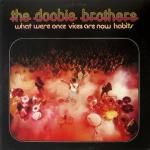 More of the Music of The Doobie Brothers
More of the Music of The Doobie Brothers
Hot Stamper Pressings of Rock Classics Available Now
This mass-produced stuff is pretty lame most of the time. Actually, that’s not really fair; the specialty audiophile limited edition pressings of most records are even worse, so the production numbers really don’t have much to do with the final product, now do they? They made millions of copies of this album, and heavy vinyl pressings are made in the thousands, but which would you rather play? I’ll take good old thin vinyl from the 70s over that heavy stuff any day of the week.
But I digress. Most copies — like most modern heavy vinyl pressings — simply lack energy. They’re flat and compressed and no matter how loud you turn them up the band never seems to be all that into the songs they’re playing.
Ah, but the good pressings show you a band that’s on fire, playing and singing their hearts out. Such are the vagaries of record production. Who can explain it or even understand it? All we know is what the finished product sounds like. The rest is guesswork, entertaining for idle minds and forum posters but of little value to those of us who take records seriously and want to hear the music we love with the best sound we can find.
Watch Out For
Tipped up top end, plain and simple. A little extra top and the guitars sparkle and Johnston’s voice gets a little hi-fi-ish. On the most ridiculously tipped-up copies, you could easily mistake such a pressing for a MoFi half-speed mastered LP. That sparkle used to thrill me forty years ago. Now it makes me roll our eyes — what the hell were they thinking, boosting the hell out of the top end like that?
And why can’t so many audiophiles today, still in thrall to that sound, recognize how unnatural it is and was? Simple answer: Vintage Audio equipment needs that extra kick. Most audiophiles have not taken advantage of the Revolutions in Audio of the last ten or so years and so must find records that give them the boost their bad audio systems need.
Those of us — and that includes many of you or you wouldn’t be spending all your money on Hot Stampers — have systems that find dramatically more information in the grooves of our records than we ever dreamed was there. We then get that information to go through our electronics and come out of our speakers with far more energy and far less distortion than we could back in the day.
Lee Herschberg, Engineer Extraordinaire
One of the top guys at Warners, Lee Herschberg recorded What Once Were Vices… (along with Donn Landee, who recorded their previous album and would take over the engineering duties on subsequent releases) as well as the first Doobie Brothers album.
You’ll also find his name in the credits for many of the best releases by Ry Cooder, Randy Newman, Gordon Lightfoot, and Frank Sinatra, albums we know to have outstanding sound (potentially anyway; if you’re on this site you know very well that you have to have an outstanding pressing to hear outstanding sound).
And of course we would be remiss if we didn’t mention the album most audiophiles know all too well, Rickie Lee Jones’ debut. Herschberg’s pop and rock engineering credits run for pages. Won the Grammy for Strangers in the Night in fact.
Side One
Song to See You Through
Spirit
Pursuit on 53rd St.
Black Water
Eyes of Silver
Road Angel
Side Two
You Just Can’t Stop It
Tell Me What You Want (And I’ll Give You What You Need)
Down in the Track
Another Park, Another Sunday
Daughters of the Sea
Flying Cloud
Further Reading